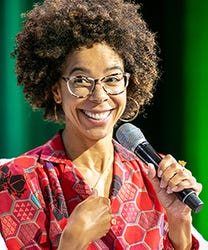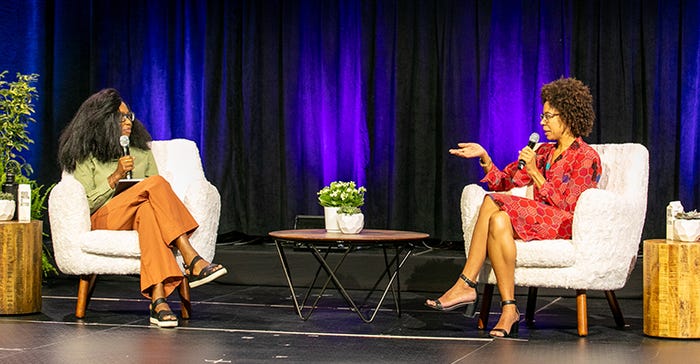October 1, 2022

Calling this a "moment of transformation," Dr. Ayana Elizabeth Johnson encouraged people, companies and policymakers to work together more, even in smaller community circles, to increase the momentum needed to impact the climate crisis.
"I think most people know what's up. It's just a question of how do we transform our economy, our society, our culture, our manufacturing, our transportation, our buildings," said Johnson, who co-founded the All We Can Save Project. "This is a moment of transformation, which is really intimidating."
In a keynote speech Friday at Natural Products Expo East in Philadelphia, Johnson said most Americans acknowledge the climate is changing.
"Things are really out of whack," Johnson said. "Whether people call that climate change or whatever terminology they use, if we ask farmers in the Midwest, they're like, 'The weather is weird.' People know that something's not right." Consequently, she doesn't spend her time focusing on climate deniers. Citing polling by Yale and George Mason universities, Johnson said only about 9% of Americans are "full-blown" climate deniers, coupled with another 12% that are "sort of dismissive."

That's why most politicians will admit "behind closed doors" that climate change is happening, Johnson said. "They just can't say it publicly because of the weird political scenarios that now exist in this country," said Johnson, who co-authored Blue New Deal, a roadmap for including the ocean in climate policy.
Much of the resistance to climate change isn't because people don't believe it is happening, but rather that they don't want to embrace change or face an unknown future. That uncertainty, Johnson said, leaves a lot of questions for people about their jobs, families, communities and industry, making them unsure what their place in society will be. Instead, everyone needs to push forward with climate solutions that make everyone feel they will have a place.
To create an easier transition, Johnson said people need to be better trained for new jobs. However, when Congress passed the Inflation Reduction Act—a trimmed-down version of the Build Back Better bill—job training wasn't included.
"One of the things that got cut was job training," Johnson said. "Why is that the thing that gets cut in the end of the negotiations? Making sure people have the skills they need for these jobs of the future is critical across this country."
It also exemplifies a bigger problem: figuring out how to push past the political polarization of climate change.
"We started knowing about climate change in the 1970s, with Exxon's own scientists being like, 'If we keep burning this stuff, it's gonna warm the planet," Johnson said. Since the U.S. House and Senate conducted climate change hearings in the 1970s, leading to the National Climate Program Act of 1978, the public has debated and argued about the issue.
"All of the voices who've been leading this discussion have been white men in the U.S.," Johnson said. "And quite simply, one demographic will never have all the answers." Instead, policymakers, environmental groups, businesses and communities need to be more inclusive.
"It's not about excluding any group," said Johnson, who wrote the national best seller book, "All We Can Save," an anthology of essays by women and the climate movement. "It's about including everybody because we have to figure this out together."
Creating a more diverse coalition begins by listening and asking people about their concerns and priorities. Instead of pitching ideas to women, people of color and others who are marginalized, use a collaborative approach to plan a project or create a possible solution. Organizations and business looking for ideas can approach Climate Justice Alliance, a collective of more than 70 rural and urban community-based organizations focused on sustainability in underrepresented communities.

Change is starting to happen
The economics of climate change solutions have rapidly shifted in the past decade. "And we're seeing the market doing a lot more work than we thought," Johnson said.
Driven by private industry, Texas and Iowa lead the country in wind energy production, according to the U.S. Energy Information Administration. "They are charging ahead because those are really good jobs and it's a very profitable industry," Johnson said. That's important because individual consumers need more choices. "There's only so much that can be done when you're dependent on what options are available."
For society to address the climate crisis, residents need to have convenient, affordable options such as curbside compost pick-up that's happening in Brooklyn, New York, where she lives. But making the leap toward tangible, impactful actions requires advocating, on a personal level, with a more communal approach. Instead of just focusing on your individual carbon footprint, Johnson suggests promoting a large goal such as bike lanes, a community composting program or a utility board cost-benefit analysis.
If 10 people show up at every city council meeting because there isn't a composting program, it can make a difference, she said. "There's something to just showing up, educating yourselves and your community and your elected officials, and beating the drum and, over time, developing more detailed policy recommendations."
On a larger scale, businesses and universities should focus on not just divesting in fossil fuels but shifting their investments to "the good stuff" that better aligns with a more sustainable mission and vision.
"We are still subsidizing fossil fuels, destructive agriculture, plastics. All these people who pretend to believe in a free market should be able to get behind that too," Johnson said. Her other advice for the business community: Share milestones along the way, not just the final achievement.
"A lot of big corporations who actually have good climate and sustainability goals behind the scenes are afraid to talk about them because they only want to talk about the work when it's done and they can declare victory on the internet, as opposed to doing the more vulnerable work of saying 'Here's our plan.'"
Editor's note: As of Jan. 1, 2023, the video of this session is not available on the virtual platform.
About the Author(s)
You May Also Like





